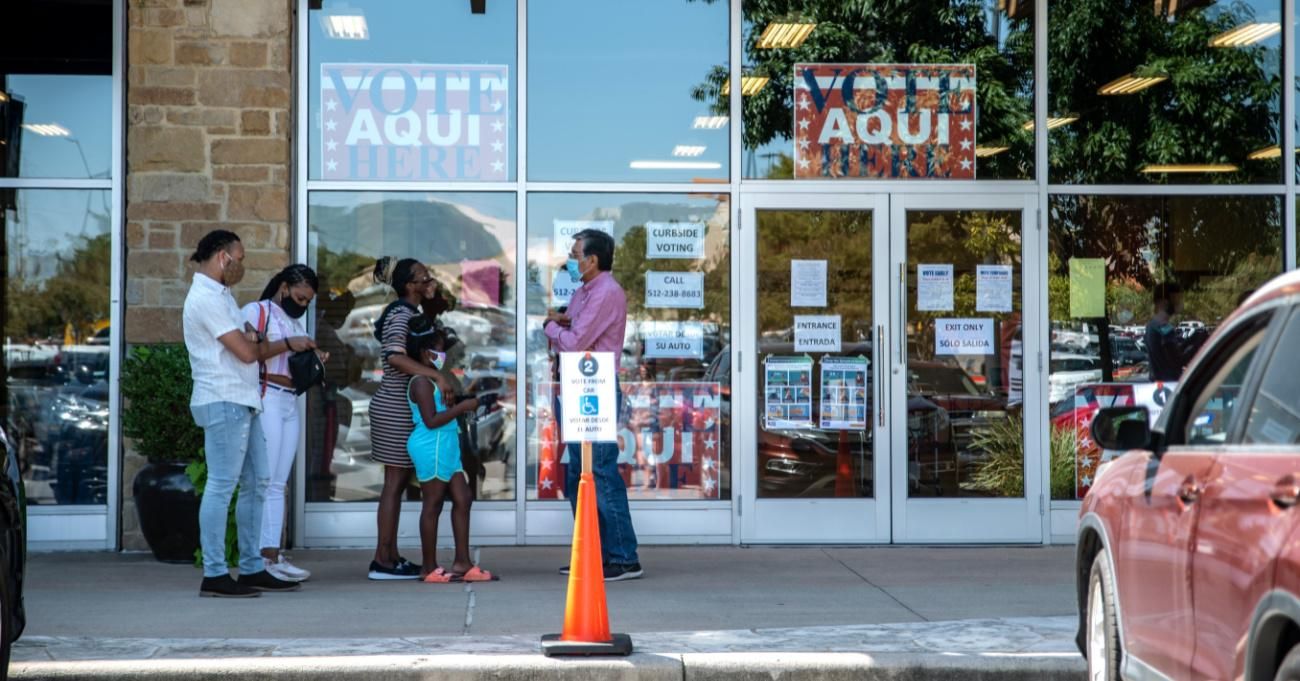
The voter suppression law signed by Texas Gov. Greg Abbott Tuesday already faces legal challenges that were promptly filed by a number of civil rights groups, which argue the restrictive measure is transparently aimed at keeping people of color from casting ballots and violates federal law.
“Make no mistake—S.B. 1 is designed to disenfranchise voters of colors, and strip them of their voice in our democracy… This is a troubling day for voting rights.”
—Jon Greenbaum, Lawyers’ Committee for Civil Rights Under Law
“The scourge of state-sanctioned voter suppression is alive and well, and Texas just became the most recent state to prove it,” said Damon Hewitt, president and executive director of the Lawyers’ Committee, in a statement. “With the passage of this bill, Texas legislators know exactly what they are trying to do—use brazen tactics to disenfranchise Black voters, Latinx voters, and other voters of color who are a growing part of the electorate and who turned out and made their voices heard in 2020. This bill violates Texas’ own state constitution and does not advance any legitimate state interests that would justify this wide-ranging attack on the right to vote.”
The law’s provisions will also negatively affect access to the polls for Black voters in Texas, many of whom used voting methods that were introduced amid the coronavirus pandemic in 2020, including early voting, ballot drop boxes, drive-through voting, and 24-hour polling places.
S.B. 1 bans the latter two provisions and strictly limits the use of the former two.
“Texas already had some of the most restrictive voting laws in the nation, and the passage of this egregious bill just made conditions for voters even worse,” said Jon Greenbaum, chief counsel and senior deputy director of the Lawyers’ Committee. “Make no mistake—S.B. 1 is designed to disenfranchise voters of colors, and strip them of their voice in our democracy… This is a troubling day for voting rights.”
In addition to discriminating against communities of color, said Common Cause, S.B. 1 will put voters in harm’s way by forcing them to cast ballots in crowded polling places as the pandemic continues.
“Rather than making it easier for Texans to vote for elected leaders who will prioritize our health and safety above their political ambitions, Gov. Abbott has just attempted to silence voters from being heard in the next election,” she added. “In signing this anti-democratic legislation, Gov. Abbott has shown he cares more about suppressing our vote than suppressing the Covid-19 virus.”
Abbott said he believed the new law could be a “paradigm” for other Republican states hoping to pass similar election laws, just as Senate Bill 8, the state’s forced-birth law that’s drawn international condemnation from human rights experts, is already being used as a blueprint for states including Mississippi and Florida.
Eighteen GOP-led states have passed more than 30 laws restricting access to the polls this year, and hundreds more have been proposed.
Democratic legislators in Texas drew nationwide attention in July when they fled the State Capitol in order to block the voter suppression legislation and other measures. In a decision that was condemned by civil rights groups across the country, the all-Republican Texas Supreme Court ruled last month that the lawmakers could be arrested for denying the state GOP quorum.
Following Abbott’s signing of S.B. 1, voting rights advocates and Democratic lawmakers renewed calls for federal voting legislation, including the For the People Act and the John Lewis Voting Rights Advancement Act, and the elimination of the filibuster.
“S.B. 1 is the first significant piece of voter suppression legislation to be passed since the House of Representatives passed the 2021 version of John Lewis Voting Rights Advancement Act, which is designed to stop voting changes like these that worsen the opportunities for voters of color, and illustrates why this congressional legislation is necessary,” said Greenbaum.
“Texas’ egregious voter suppression bill is now law,” said former Labor Secretary Robert Reich on social media, demanding to know why the Biden administration has not “made voting rights a top priority.”
“Meanwhile, voting rights legislation languishes in the Senate because [Sens. Joe Manchin (D-W.V.) and Kyrsten Sinema (D-Ariz.)] refuse to work around the filibuster,” said Reich. “This is a four-alarm fire for our democracy.”
‘Four-Alarm Fire’ for Democracy as Texas Voter Suppression Bill Becomes Law
Source: Articles Viral Post
0 Comments